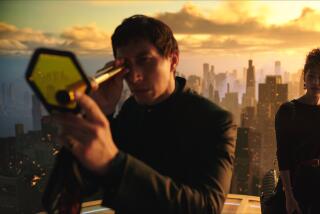New Language of Film: Quick and Fast
Ask anybody. Go ahead. But make it quick.
Speed (“Speed” being a prime example) is in the ascendant. Years ago, back around the time of “Blade Runner,” director Ridley Scott was theorizing, to several critics’ horror, that the pace at which we view successive pictures in film would be accelerating to a virtual vanishing point, thanks to the audience’s decreasing attention span and the almost evolutionary increase in its absorption abilities. Since the rise of the AVID, the digital editing machine, there has even been a statistical increase in the number of cuts that movies contain (probably because it’s easier to make them). And if you consider just the rate at which the media bombard our senses without even trying, you have to figure that anything calling itself entertainment has to contain an increasing--and increasingly hysterical--number of images just to get noticed.
Is this bad for movies? Well, it certainly seems to relegate sober, studied cinema to extinction. But it also makes the recent arrival of “Run Lola Run”--the biggest hit in Germany last year, and the hippest movie here this year by far--nothing short of perverse.
“Lola’s” director, Tom Tykwer--a 34-year-old devotee of such filmmakers as Denmark’s Lars von Trier and the late Krzysztof Kieslowski--has made a film that takes all the elements that make so-called serious cinephiles cringe--the rapid-fire editing, the percolating techno soundtrack, the reliance on constant visual stimuli--and made the perfectly synthesized movie: crowd-pleaser and critics’ darling. “Lola” never stops. But it never stops thinking, nor lets you stop, either.
Brief synopsis: Lola (the flame-haired Franka Potente) is late for a rendezvous with her petit criminal boyfriend, who shortly thereafter phones her with the frantic news that he’s left a hot $100,000 on a subway and is going to be killed in 20 minutes if he can’t produce the money. So Lola sets out to get it--in a breathtaking sprint through the space-time continuum.
The style of the film? It gives new meaning to “motion” picture.
“You can beat time only in movies,” Tykwer said in New York recently. “In reality, we all know we’re victims of time--it’s going on, going on, we can’t stop it. Every second we come closer to our own death.
“But in the movies there’s a miracle quality, the feeling that there is control of time. It’s one of the basic elements why cinema for us is so magic. We beat time. We can still see Marilyn Monroe, and yet we know she’s ashes. Movies are the modern form of mummification.”
What’s happening in “Lola” is that she does beat death by beating time--”with the weapon of movies,” as Tykwer put it.
Films have always played with time, usually by squeezing a lot of it into the standard length of the feature film, but Tykwer wanted to see what would happen if he took a short amount of time--the 20 minutes Lola’s given to save her lover Manni--and stretched it for 90 minutes, with transmogrifying circumstances and conclusions.
Other directors have played with time, and with coincidence. Kieslowski’s “Blind Chance” (1982) and “Double Life of Veronique” (1991) are good examples of the director playing God, moving his players around in a malleable universe. Others have followed that lead, with the results being mixed--largely because the directors in question were more concerned with technique than emotion.
“You have to have something substantive to deliver,” Tykwer said. “If you just want to show off your experimental technique, that’s not enough. You have to get both things together. Look at Lars von Trier. He had a huge hit with ‘Breaking the Waves,’ a huge hit. Millions saw it. And yet it’s still one of the most radical experimental films we’ve seen in a long time. On the other hand, it’s strongly emotional, and something people want to see.”
Tykwer’s a fan of the films of Von Trier and Thomas Vinterberg (“The Celebration”), the so-called “dogma” films in which the presiding ethos is about purifying film language, ridding it of artifice, even music--which, judging by the “Lola” soundtrack, isn’t something Tykwer would part from easily.
“ ‘Run Lola Run’ is my dogma film,” he said. “You know what Lars von Trier is doing now? He doesn’t give a . . . for dogma. He’s doing a film with a hundred cameras for $15 million, a musical with Bjork! He obviously doesn’t care about dogma at all. It was all just a postulate thing: Listen, we haven’t even reached by far 10% of what film language can offer, so why do we think it’s coming to an end? We’re still at the beginning. We still can discover so many possibilities. If we stick to the idea that strong films are always personal, then there’s 5.8 billion possibilities for films, ‘cause there’s that many people whose views we can share.”
Tykwer pauses for a moment, pondering the enormity of his theory. “Not,” he says, “that they should all become directors. . . .”
More to Read
Only good movies
Get the Indie Focus newsletter, Mark Olsen's weekly guide to the world of cinema.
You may occasionally receive promotional content from the Los Angeles Times.










